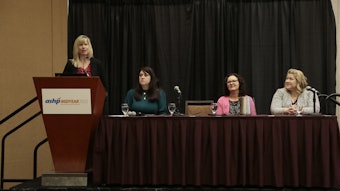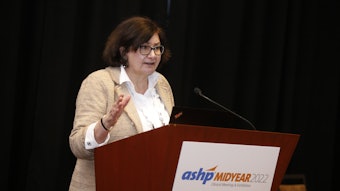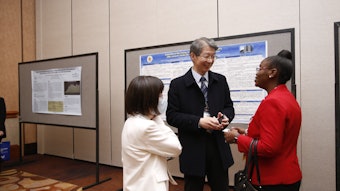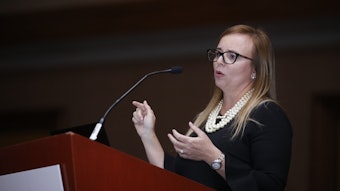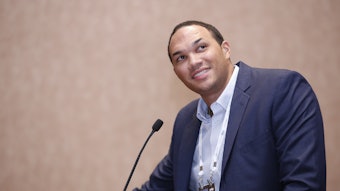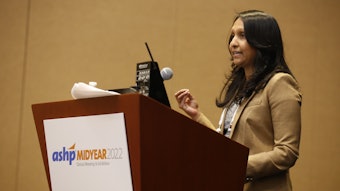Learn About Helicobacter pylori Treatment Options
Catch up on current and up-and-coming treatments for the often-unrecognized infection.

A 53-year-old man with a complex medical and medication history reports having episodes of nausea, vomiting, and abdominal pain for several weeks. What’s your treatment recommendation for the physician whose workup includes bloodwork to diagnose Helicobacter pylori infection while considering a possible endoscopy?
If you said serologic testing isn’t predictive for diagnosing H. pylori infection, but you can devise a treatment plan if the patient tests positive for infection by endoscopy or another acceptable method, you’re correct, said Denise Kelley, clinical pharmacy specialist in internal medicine for Ascension Seton in Austin, Texas.
Kelley opened the Dec. 6 Midyear Clinical Meeting & Exhibition session Revisiting the Story of H. Pylori: An Update on Managing Helicobacter Pylori Infection.
About a third of the U.S. population is estimated to harbor H. pylori in the digestive tract. Kelley said the reason pharmacists don’t encounter H. pylori more often in clinical practice is that many infections are asymptomatic. But untreated infections can lead to peptic ulcer disease, non-ulcer dyspepsia, gastric cancer, and mucosa-associated lymphoid tissue lymphoma.
For that reason, Kelley said, treating a diagnosed infection is better than leaving it unaddressed.
She said decisions about which medication regimen to use are complicated by a lack of solid effectiveness data and the need to base recommendations on antimicrobial resistance rates that may not be readily available.
Guidelines from the American College of Gastroenterology (ACG) describe several treatment options, including clarithromycin triple therapy, bismuth quadruple therapy, and concomitant therapy consisting of a proton pump inhibitor (PPI), clarithromycin, amoxicillin, and metronidazole.
For Kelley’s case patient, who tested positive for H. pylori infection by endoscopic biopsy, the treatment workup required an evaluation of past exposure to macrolides, penicillin allergy history, and local resistance rates to clarithromycin.
Kelley noted that clarithromycin triple therapy (clarithromycin, amoxicillin, and a PPI) was an ACG first-line regimen for H. pylori infection in 2007. But ACG now recommends the regimen only when local rates of H. pylori clarithromycin resistance are less than 15%.
Kelley said most clinicians probably don’t know their local resistance rate. Limited available surveillance data — including data in Texas — indicate that local rates often exceed 15%, making clarithromycin triple therapy a poor option for the case patient. The patient also reported taking azithromycin twice during the past year, which raised a red flag about macrolide exposure.
An informal poll of the Midyear session audience found most in favor of AGC’s current first-line recommendation of quadruple therapy with bismuth, tetracycline, metronidazole, and a PPI for the case patient.
Kelley agreed that the regimen “is probably the best choice” for the patient.
If clinicians want to make elimination of H. pylori infection the therapeutic goal, newer options — also with limited data — are also available, said session speaker Emmeline Tran, assistant professor at the Medical University of South Carolina. The main benefit of these treatments is that they may be better than traditional therapy at eradicating the infection.
“We want to try to get to a 90% eradication rate,” Tran said. “We haven’t really been able to get that with our past regimens.”
Novel treatment strategies include fluoroquinolone- and rifabutin-based therapy and high-dose regimens consisting of amoxicillin with dexlansoprazole or esomeprazole, Tran said. She said studies show eradication rates in the 90% range for regimens consisting of levofloxacin/omeprazole/nitazoxanide/doxycycline or rifabutin/amoxicillin/omeprazole.
Additional novel options include upping the PPI or metronidazole dosage in regimens that use those medications, increasing the duration of treatment, and adding probiotics to the regimen, Tran noted.
A final audience poll suggested the group isn’t yet ready to consider novel H. pylori treatments, preferring instead to recommend bismuth quadruple therapy for the case patient.
Tran indicated that progress toward better regimens for H. pylori treatment may be limited in part because clinicians don’t seem to view the illness the way they do other infectious diseases. An audience poll revealed that attendees’ clinical practice sites do not perform H. pylori susceptibility testing — a standard practice for the management of many infectious diseases.
“We just haven’t gotten there quite yet” for H. pylori, Tran said.

